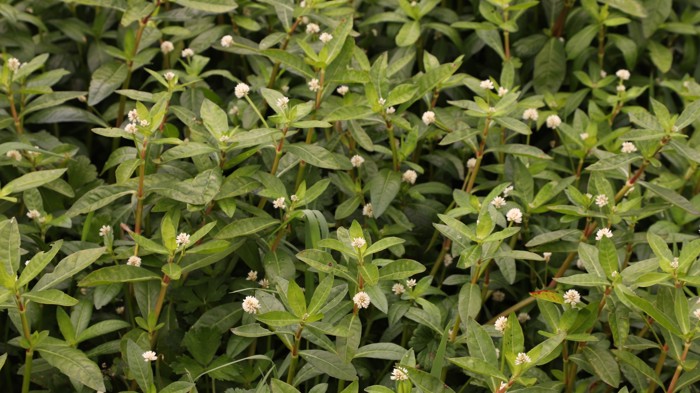Alligator weed


Alligator weed
What does it look like?
Alligator weed is a perennial amphibious (aquatic and terrestrial) plant. It is typically bottom-rooted at the margins with floating mats which spread across the water surface. It can also be deep-rooted in wet soils.
The stems are hollow and buoyant; leaves are green, hairless, waxy, with a conspicuous midrib (4 x 10cm long). The flowers resemble those of white clover but are smaller and each cluster is produced on a long stalk.
Alligator weed prefers temperate climates and is found in still or slow-moving water bodies, including lakes, streams and drainage channels (also tolerating brackish water). Terrestrial habitats including pasture, cropland and gardens.
Why is it a problem?
Alligator weed is very hardy and is a strong competitor, tolerating a wide range of environmental conditions and disturbance regimes, including flooding and submergence. It prefers full sun but is more shade tolerant than typical pasture grasses, therefore it may be advantaged by slight shading.
Alligator weed doesn’t set viable seed in New Zealand, it reproduces vegetatively from stem nodes and root fragments with are easily spread. This means we have a good opportunity to prevent its spread, by ensuring boots/equipment/machinery is clean between sites where this weed is present.
Control methods
Please contact your local regional council for advice on controlling this plant.
Prevention
In narrow waterways you can prevent the return of both land and aquatic weeds with riparian/streamside planting to increase the shade levels. This has a negative impact on the weeds as they often require high light to thrive. It also improves water quality, as shade is an important environmental factor for native freshwater fish & invertebrates and a healthy ecosystem.
Related information
Management programme
National Pest Plant Accord (NPPA)
Unwanted organisms
Rules
More images

Photo credit: Trevor James, Weedbusters

Photo credit: Trevor James, Weedbusters

Photo credit: Trevor James, Weedbusters

